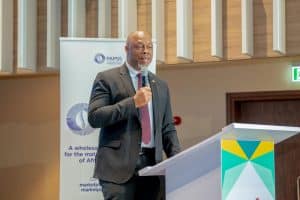
Addressing Inequality and Maximizing Benefits: The Role of Individual Freedoms and Digital Rights in the AfCFTA
The African Continental Free Trade Area (AfCFTA) agreement, according to Teniola Tayo, who has a wealth of experience in policy analysis, consultancy, and legislative work, has the issue of tackling rising interstate inequality and unequal development. While expanding intra-African trade is the immediate priority of AfCFTA, concerns have been raised regarding the uneven distribution of advantages among nations, cities, businesses, and economic elites. The economic inequalities are highlighted by the income differences among the members, with Nigeria, South Africa, and Egypt accounting for 50% of Africa’s GDP.
She has demonstrated how South Africa’s dominance and economic supremacy may result in trade benefits that unfairly favor them over other nations. She has expressed concern over the possibility that increasing intra-African trade brought about by the AfCFTA will exacerbate economic gaps, favoring African industrial elites and escalating wealth disparities. The goal of prosperity for all Africans may be compromised by this inequity, which could also spark civil instability.
She has recommended a number of strategies to address these issues, such as developing complementary regional value chains that include smaller economies, integrating rural areas into trade economies, supporting Small and Medium Enterprises, enacting redistributive taxation and financing, and tracking trade returns using metrics like job creation and poverty reduction. The AfCFTA can encourage equitable and sustainable growth in Africa by adopting a practical and inclusive strategy.
I share her concerns about inequality and do not disagree with her proposals, but I would like to suggest an additional step that member states must take in order to reduce inequality and maximize the benefits of the AfCFTA. While AfCFTA has the potential to lift 30 million people out of extreme poverty by 2063, this will not be equally distributed in the member states.
Away from the one large market that AfCFTA will bring to Africa, enjoying the benefits of the market will be the initiatives of the state before the AfCFTA’s policies. Some of the issues that can make some countries gain more than other countries are respecting Individual Freedoms/real freedoms and Digital Rights.
Individual Freedoms
The idea of Individual Freedoms or individual autonomy is comparable to that of individualism. Amartya Sen has argued that development involves enhancing the actual freedoms that people have, and curbing these freedoms is linked to a decrease in development.
In his book “Development as Freedom,” Amartya Sen recognizes the importance of factors like, civic organizations, and social norms in determining collective and individual freedom. He calls attention to the need for people to have access to resources and the ability to utilize them to develop their abilities and escape poverty, inequality, and repression.
Individual freedoms are deprived by the laws and values. Some African countries have a number of laws that dwindle individual freedoms, for example, some countries still observe the vagrancy act which criminalizes poor people for being poor, prostitutes, and beggars. This topic has been well explained by Anneke Meerkotter in most of her works, such as on sex workers in Zambia, Marginalized groups of urban spaces and Vagrancy laws. People are to be free to do what they want to do as long as negative externalities are controlled. It is from individual freedoms that the opportunities can be exploited.
For example, it is unlikely for people to prefer the countries where dress code or a person’s walking style are strictly observed by the law. Recently, BBC Swahili opened its office in Kenya although Tanzania has more Swahili Speakers citing a more cumbersome investment environment in Tanzania compared to Kenya. Similarly, the countries that embraces the laws that dwindles freedoms will not get African or other investors and thus experience increased inequality regardless of the implementation of AfCFTA.
Digital Rights
Digital rights are the fundamental rights and freedoms that individuals should have in the digital realm. These rights encompass privacy, freedom of expression, access to information, and cybersecurity. Upholding and protecting these rights is crucial in fostering a free, inclusive, and secure digital environment.
Godwin Myovella, an economist stated that “In today’s world, digital technologies have become a necessity rather than a luxury.” However, the digital divide remains a significant challenge, especially in developing countries with low access to ICTs. Digital technology limitations and lack of access result in social and economic marginalisation, which lowers both the quality of life for an individual and society as a whole.
Thus, AfCFTA member states with a relatively huge digital divide will have less likelihood to benefit fully the one African Market compared to the ones which has addressed the adequately.
These are the writer’s own opinions and do not necessarily reflect the viewpoints of Liberty Sparks. Do you want to publish in this space? Contact our editors at [email protected] for further clarification.



